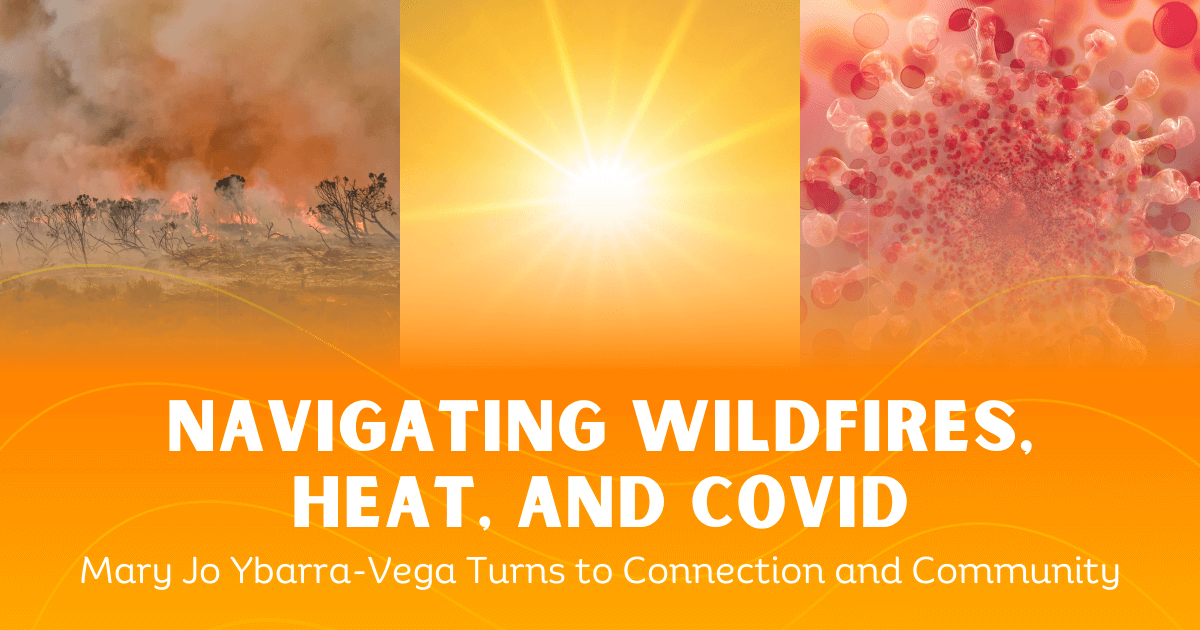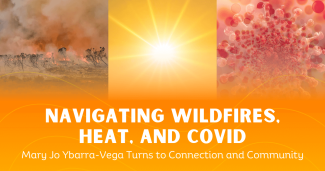In the Field: Navigating Wildfires, Heat, and COVID, Mary Jo Ybarra-Vega Turns to Connection and Community

[Editor’s Note: Recently, Rushil Jain, MCN intern, sat down with Mary Jo Ybarra-Vega, MS, LMHC, Outreach and Behavioral Health Coordinator at Quincy Community Health Center in central Washington. At Quincy, Ybarra-Vega coordinates the promotores program and works closely with agricultural workers. Here we publish Mary Jo’s responses, edited for brevity and clarity, in its entirety.]
Before the pandemic, we started getting really hot days in August, and then we started getting wildfires right in our area. It takes months for us to plan this back-to-school health fair event. In the past couple of years, just before we moved our event, there was so much smoke and heat that we literally had two days to move this huge event that took six months' worth of planning to a venue inside at a community center. So since then, we've moved our event inside knowing that it's only going to get hotter from here.
This also relates to the main population we work with: migrant workers. When workers come here, they're on contracted work so they want to move fast and quick. They're going to exert themselves, more so with the heat. We should not be having deaths because of heat, and again, who are the ones that are most impacted? It's people of color and in my community, they’re agricultural workers and are facing poor conditions. A lot of our workers don't want to report these poor working conditions because they're going to lose their jobs. One gentleman that I interviewed basically said, “Mary Jo, if I don't work again my family doesn't have food, I can't keep the electricity on.”
To introduce myself, my name is Mary Jo Vega and I am a licensed mental health counselor and do outreach and behavioral health coordination at Quincy Community Health Center in Washington. The majority of the people who come to Washington State to work in agriculture are primarily H-2A workers, so we work a lot with contracted workers who come in from primarily Mexico. I do prevention education with the farmworker population and migrant seasonal farmworkers, and that covers just about any topic that you can think of. [During the hottest months,] we're doing heat and wildfire smoke prevention, and we're also covering sexual health, oral health, and nutrition. Many of the workers we interact with have never had health screenings before and have limited education about health and nutrition, so it’s really fulfilling that we’re able to provide them with such insights.

To deal with this growing problem, we started a farmworker phone call that started here for community health workers or promotores de salud that work with a lot of the Latinx farmworker community. For example, once the COVID-19 pandemic hit, we implemented weekly or bi-weekly phone calls about how do we help farmworkers that are going to be faced with COVID issues. These phone calls were about mitigating COVID within the farmworker population in terms of best practices and support resources.
At the same time as the pandemic, increased wildfire smoke led to breathing issues because workers were outside, constantly being exposed to COVID-19 and smoke inhalation. So we created an ad hoc committee to seek legislative support from the states of Washington, Oregon, and California. The main objective of this committee was to request government officials to address heat and wildfire smoke issues. Our hope was that we would begin and be the catalyst for the rest of the country to have the same rules across the board so that workers who migrate or move from state to state would know that the rules are the same. Soon enough, we started seeing a growth of state officials, county officials, and federal officials who joined our calls to find out what was happening.
When teaching our population about heat and wildfire smoke, it is important to consider how the heat impacts folks who economically don't have sustainable housing. We're seeing more chronic issues with breathing. Children having issues with breathing issues from both heat and wildfire smoke. I clearly recall one instance when a group of workers came to the emergency room. The doctors all thought they had symptoms of COVID-19 when in reality, they were suffering from heat stroke. Everything's impacting everything. How do we begin to realign ourselves with the environment and the climate and for us to change with it and so that we have that relationship again?
As we talk about community health centers, it’s very interesting to see community health workers that have that special talent to work with that Latinx population. So the research that's happening, the collection of data pushing the information out to the community, going to a stakeholder meanings, going to community meanings, doing outreach day to day. That can move policy and legislation. The one thing that community health centers can do differently is have a budget for promotoras de salud (community health workers). Give them wings, let them do that. They're natural advocates. They're really good at it. Give them the right tools and help them create the tools that they need to be more effective.
Resources:
Learn more about Quincy Community Health Center.
Read a recent publication co-authored by Mary Jo: Agricultural Worker Perspectives on Climate Hazards and Risk Reduction Strategies
To join the coalition’s meetings, where CHWs and other clinicians gather to share information and resources on farmworker health relating to COVID-19 and beyond, please contact coordinators Christian Castro from the Northwest Regional Primary Care Association (ccastro@nwrpca.org) or Alexis Guild from Farmworker Justice (aguild@farmworkerjustice.org) for more information.
- Log in to post comments
